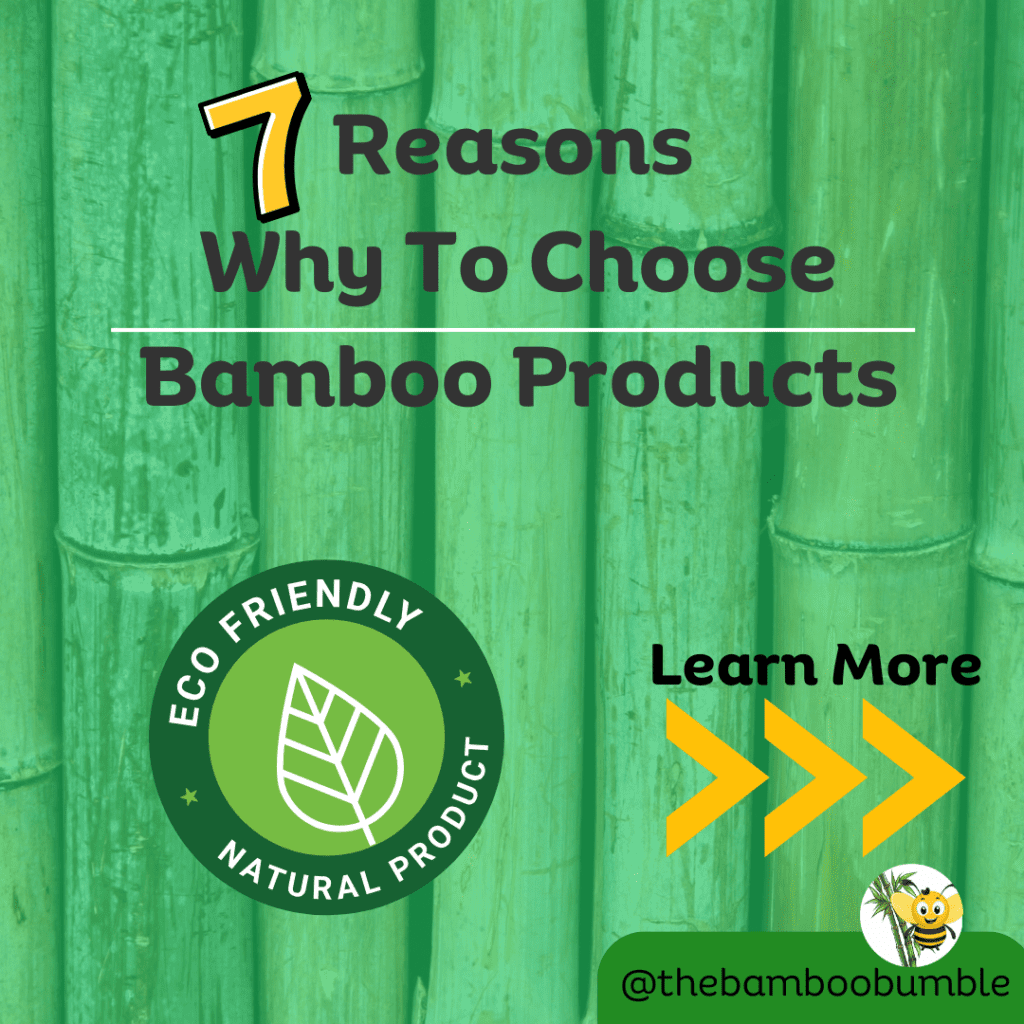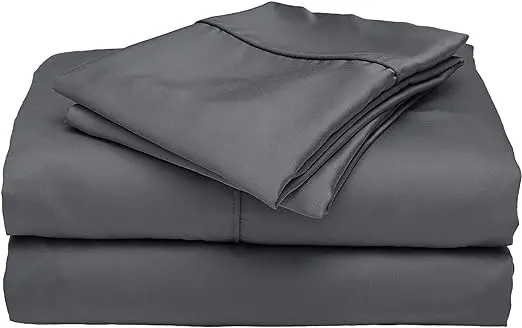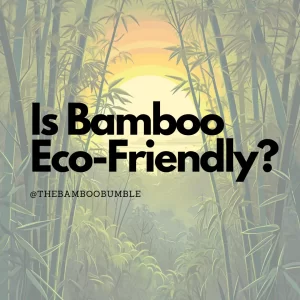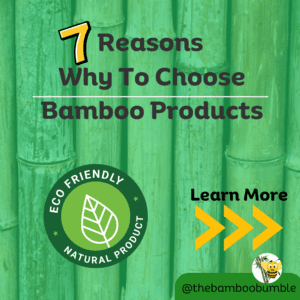Pros and Cons: Bamboo vs. Cotton Sheets
Considering a new set of sheets? Maybe those old ones have just worn out and it’s time for some new ones. Now you’ve started looking, you’ve come across bamboo sheets as an alternative to what you were originally thinking. Are bamboo sheets for me? Read on to find out more.
>>> Scroll >>>
Your personal preference and style are going to weigh heavily on your decision. Ultimately, it is up to you! Below, we dive deeper into various different features and compare bamboo versus cotton sheets. If you are still trying to decide, hopefully, the information below will help steer you towards the right sheets for your personal needs.
Table of Contents
Bamboo vs. Cotton Sheets: Which Type of Bed Sheet is More Comfortable?
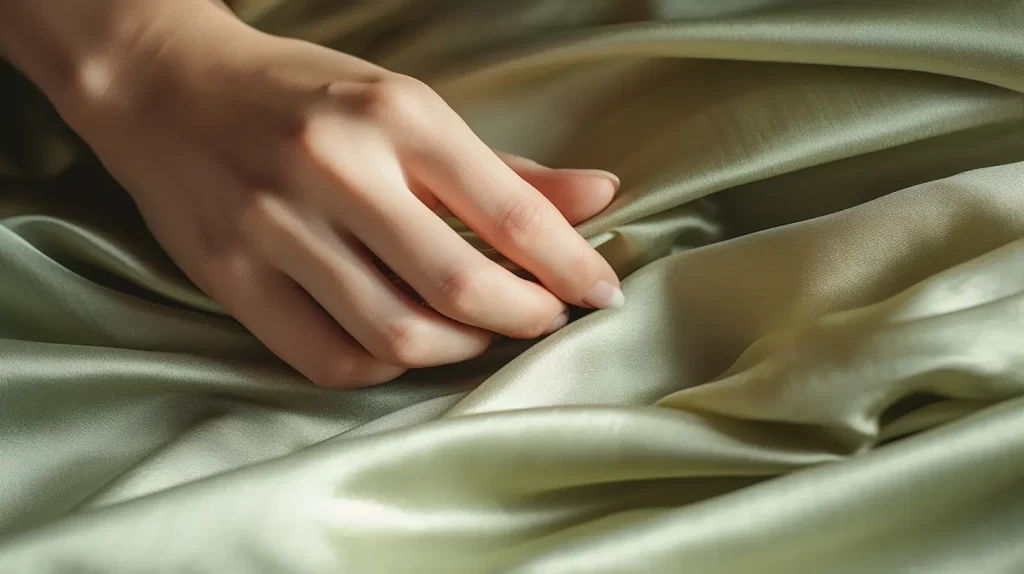
When it comes to choosing between bamboo vs. cotton sheets, we’ve dug into a diverse range of opinions, each with valid points. Bamboo sheets are widely celebrated for their unparalleled softness and luxury feel. Many users appreciate their breathability, which is a game-changer for those warmer nights, and their eco-friendly properties resonate well with our environmentally conscious customers.
Cotton’s versatility in different climates, especially its warmth retention in cooler temperatures, is something that many of our users value as well. For us, we live in a northern climate and actually still prefer the coolness of the bamboo sheets. My wife and I prefer different levels of warmth. Using bamboo sheets as a base, it allows one of us to add an extra layer and both of us be super comfortable.
- Softness of Bamboo Sheets: Bamboo sheets offer a unique softness that many find more luxurious and gentle on the skin. Their smoothness makes them a popular choice for those seeking a softer, more indulgent sleeping experience.
- Softness of Cotton Sheets: Cotton sheets bring a classic comfort that’s familiar and reassuring. Their traditional softness appeals to those who prefer a more conventional feel in their bedding.
- Breathability of Bamboo Sheets: Bamboo sheets are highly breathable, making them a great option for those who tend to sleep hot or live in warmer climates. They offer excellent air flow, keeping sleepers cool throughout the night.
- Breathability of Cotton Sheets: Cotton sheets also provide good breathability. While they might not offer the same level of air circulation as bamboo, they strike a balance between warmth and breathability, suitable for various climates.
- Heat Retention of Bamboo Sheets: Bamboo sheets are effective at regulating temperature. They are good at retaining enough heat for comfort while ensuring that it doesn’t get overly warm, ideal for those seeking a temperature-balanced sleep.
- Heat Retention of Cotton Sheets: Cotton sheets are known for their ability to retain heat, making them a preferred choice for cooler climates or for those who get cold easily at night. They provide cozy warmth that’s comforting in colder conditions.
This really comes down to personal preference from both the style and feel standpoint. For us, living in a northern climate, bamboo sheets let my wife and I be comfortable when sleeping regardless of season. They give us the flexibility to be as cool or warm as we want allowing us both to be comfortable as we’re sleeping. For us, bamboo sheets from a comfort standpoint are a clear winner.
Which Type is More Durable: Bamboo vs Cotton Sheets?
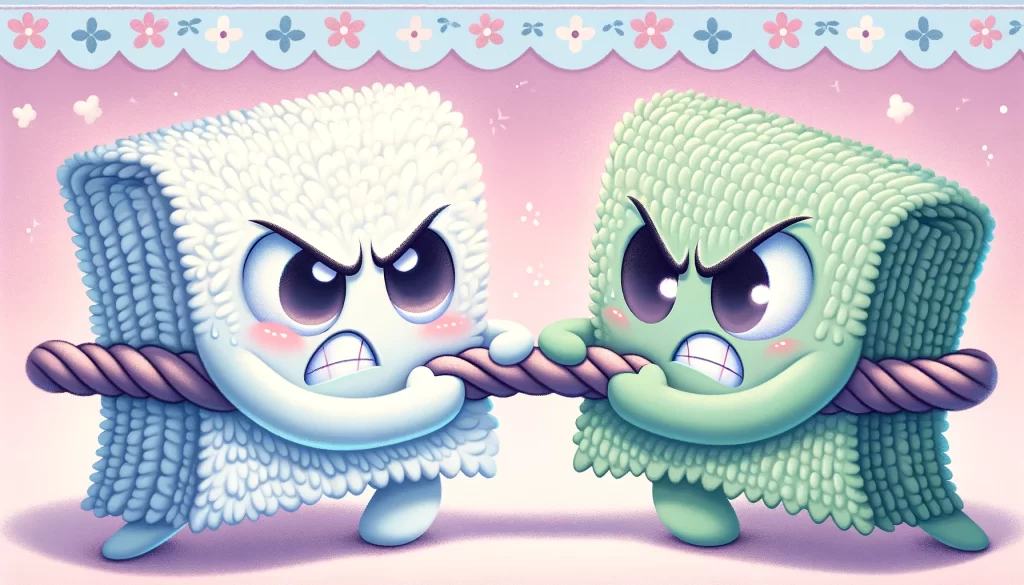
When it comes to durability, both bamboo and cotton sheets have their merits, and the choice can depend on how you value certain aspects of longevity and resilience.
- Longevity of Bamboo Sheets: Bamboo sheets are often praised for their long-lasting nature. Their fibers are strong, which means they can withstand a good deal of wear and tear, maintaining their quality and feel over time. Users appreciate that bamboo sheets tend to resist pilling and stay smooth for longer.
- Longevity of Cotton Sheets: While high-thread-count cotton sheets are celebrated for their endurance and potential to last many years, it’s important to note their limitations. Over time, even with proper care, they may show signs of wear such as thinning or fading, particularly in areas of frequent use. This wear can affect their overall comfort and appearance. Although they can become softer with age, this softness sometimes comes with a trade-off in terms of diminished fabric strength and reduced vibrancy of colors and patterns. Thus, the long-term resilience of cotton sheets, especially lower thread counts, may not always meet the expectations set by their initial quality.
- Factors Impacting the Lifespan of Bamboo Sheets: The longevity of bamboo sheets hinges on their quality, usage, and care. Superior quality bamboo fabric ensures durability, but their lifespan is influenced by how they’re treated. Gentle care with mild detergents and avoiding high heat preserves their softness and strength. While resilient, bamboo sheets can succumb to wear if exposed to harsh chemicals or extreme temperatures. Proper maintenance can significantly extend their life, keeping them as a cozy retreat in your bedroom for a longer time.
- Factors Impacting the Lifespan of Cotton Sheets: Cotton sheets, while widely used, inherently face limitations in their longevity. Even with a high thread count and robust weave, they naturally tend to thin out and lose their structural integrity over time. The softness that develops with age often comes with a trade-off in terms of reduced fabric resilience. Despite careful laundering, they are prone to gradual wear and tear, diminishing their initial comfort and aesthetic appeal. This inherent attribute of cotton fibers means that, over time, they may not retain the same level of quality and durability as when they were new.
For us, we prefer spending a little more up front and saving money longer term. It’s a balancing act, however, as long as you care for your bamboo sheets you can definitely save $$$ and be comfy!
Ease of Care: Bamboo vs. Cotton Sheets
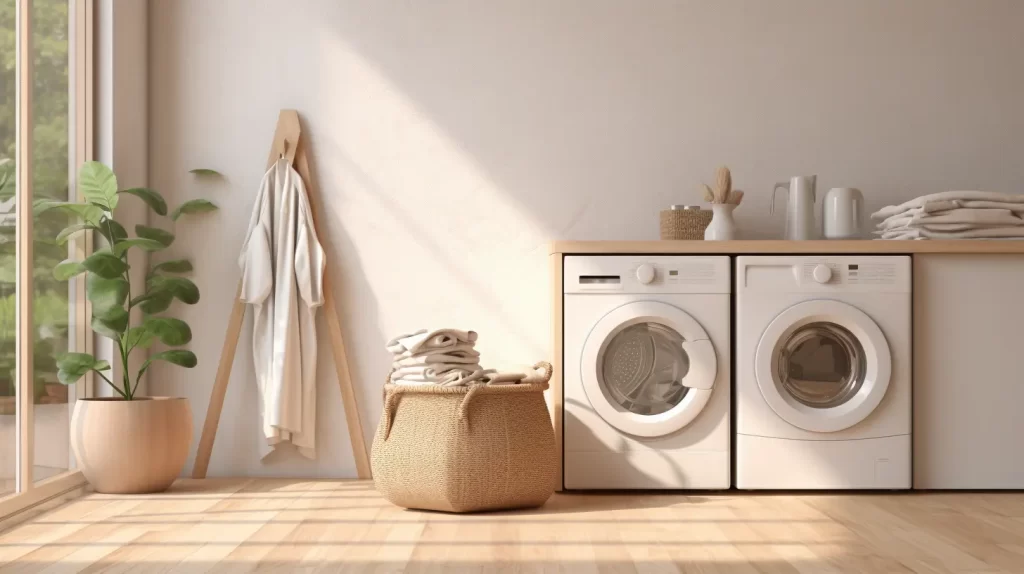
The ease of caring for your sheets can be a deciding factor, and both bamboo and cotton sheets come with their own set of care instructions.
- Washing and Drying Bamboo Sheets: Bamboo sheets prefer the gentler side of laundry care. They thrive best when washed in cold to warm water with mild detergents and should be dried on low heat to preserve their fibers. High heat can be harsh on bamboo, leading to potential damage or shrinkage.
- Washing and Drying Cotton Sheets: Cotton sheets are less fussy. They can handle a range of temperatures and are more forgiving with regular detergents. They can be tumble dried without much worry, though high heat might cause some shrinkage over time.
- Ironing and Wrinkle Resistance: Bamboo sheets boast natural wrinkle resistance, often requiring little to no ironing. Cotton, while cozy, tends to wrinkle and may need a quick iron for that crisp, smooth look.
- Shrinkage and Stretching of Bamboo Sheets: Bamboo sheets can experience shrinkage if exposed to high heat in washing and drying. However, they generally maintain their shape and size with proper care.
- Shrinkage and Stretching of Cotton Sheets: Cotton sheets can shrink, especially in the first few washes. They’re less prone to stretching but might lose their perfect fit over time with repeated laundering.
Bamboo sheets require a bit more attention in their care to maintain their quality, while cotton sheets offer a bit more robustness in routine washing but might need extra steps like ironing. If you don’t want to have to pay attention to the care directions for your sheets, cotton would have an edge here.
For us, we normally wash with cooler water and dry on low just in general. As a result, our bamboo sheets have performed very well as compared to some of our cotton sheets.
What are the environmental impacts of bamboo vs. cotton sheets?

This one you can probably guess – bamboo is a clear winner. Read on for more details.
- Ecological Impact of Bamboo Sheets: Bamboo sheets come from one of the fastest-growing plants on Earth, offering a more sustainable alternative in the textile industry. Bamboo cultivation requires less water and very minimal to no pesticides, reducing its ecological footprint. However, the processing of bamboo into fabric sometimes involves chemical treatments, which can raise environmental concerns. The key is in choosing bamboo products made with eco-friendlier processing methods.
- Ecological Impact of Cotton Sheets: Cotton, while a natural fiber, has a more significant environmental impact. It’s a thirsty crop, requiring large amounts of water, and is often grown using pesticides and fertilizers that contribute to soil and water pollution. Organic cotton offers a more sustainable alternative, though it still demands high water usage. The ecological impact of cotton is largely tied to these agricultural practices.
- Sustainability of Bamboo Cultivation: Bamboo is inherently sustainable due to its rapid regrowth and ability to thrive with minimal fertilizers and pesticides. It also helps in soil stabilization and carbon sequestration. With sustainable practices, the cultivation and harvesting of bamboo can have a positive impact on the environment due to its rapid growth and positive impact on carbon in the atmosphere.
- Sustainability of Cotton Cultivation: Cotton’s sustainability is a more complex issue. Traditional cotton farming methods can be resource-intensive and environmentally taxing. Advances in sustainable farming practices and the rise of organic cotton are steps towards mitigating these impacts, but the overall sustainability of cotton cultivation is still less than that of bamboo.
For us, bamboo is a clear winner in this case. Given this, using bamboo products (sheets or otherwise) makes us feel good and feel like we’re doing something to leave a better world for our kids.
Pros and Cons: Choosing Bamboo vs. Cotton Sheets
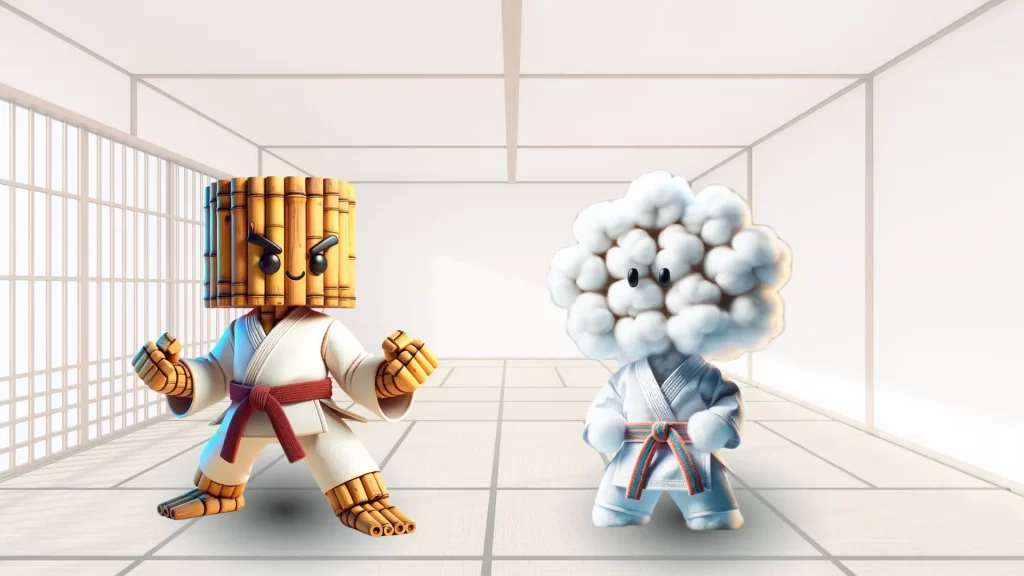
Let’s just summarize the main points. Here are the benefits and drawbacks of each distilled down.
- Benefits of Bamboo Fabric:
-
- Softness: Exceptionally soft, often compared to cashmere, enhancing sleep comfort.
- Moisture-Wicking: Excellent at absorbing moisture, keeping the sleeper dry and comfortable.
- Thermal Regulation: Naturally temperature-regulating, ideal for both hot and cold sleepers.
- Eco-Friendly: Bamboo grows rapidly and requires less water and minimal pesticides, making it a sustainable choice.
- Drawbacks of Bamboo Fabric:
-
- Chemical Processing: The processing of bamboo into certain types of fabric, like bamboo rayon, often involves chemical treatments. However, more eco-friendly methods like the production of bamboo lyocell use closed-loop processes that minimize environmental impact.
- Cost: Generally more expensive than cotton, which might be a consideration for budget-conscious buyers looking to save money short term.
- Care Requirements: Requires gentle washing and avoidance of high heat to maintain longevity.
- Benefits of Cotton Fabric:
-
- Versatility: Available in various weaves and textures to suit different preferences.
- Breathability: Good air circulation, especially in lighter weaves like percale.
- Durability: High-quality cotton can be very durable and even soften over time.
- Ease of Care: Generally, cotton is easier to care for and can handle higher temperatures in washing and drying.
- Drawbacks of Cotton Fabric:
-
- Water and Pesticide Use: Traditional cotton farming requires significant water and pesticides, impacting the environment.
- Heat Retention: Some cotton sheets, particularly denser weaves, can retain too much heat for hot sleepers.
- Prone to Wrinkling: Especially in certain weaves, cotton can wrinkle easily, requiring more effort to maintain a crisp look.
There is, of course, nuance to this conversation. For example the actual growing of bamboo versus cotton is more eco-friendly in general with a tremendous upside for the environment. The processing of bamboo versus cotton tends to be a little more environmentally friendly on the cotton side depending on the manufacturer. Now this comes down to the process itself, and the harsher processes around how cotton is grown versus how bamboo is turned into a textile can both be mitigated in a way such that they both have less of an environmental impact. It comes down to researching your products and specifically the manufacturing process and growing process around those products such that you can truly understand the environmental impact of what you are buying. In general, however, bamboo has a less impact on the environment. The minimal use of pesticides and the smaller requirement for water make bamboo the more eco friendly choice!
Conclusion: Bamboo vs. Cotton Sheets
In the bamboo vs. cotton sheets showdown, both contenders have their unique strengths. Bamboo sheets shine with their incredible softness, moisture-wicking properties, and eco-friendly credentials. They’re a luxurious choice for the environmentally conscious and those seeking comfort with a lighter ecological footprint.
Cotton, on the other hand, remains a classic with its familiar feel, durability, and ease of care. It’s the time-honored choice for those valuing tradition and straightforward maintenance.
Ultimately, the best choice boils down to your personal preferences and priorities. Whether it’s the sustainable luxury of bamboo or the classic comfort of cotton, your perfect night’s sleep is waiting in the weave of your choice.
Happy slumbering! 🌙✨

Bamboo FAQ
Q: What are the different types of bamboo sheets available in the market?
A: The different types of bamboo sheets available in the market include bamboo viscose (or rayon), bamboo lyocell, and bamboo linen.
Q: What are the types of cotton sheets that can be found?
A: The types of cotton sheets available include percale, sateen, twill, and jersey sheets. Each type offers a distinct feel and texture, catering to different preferences in bedding comfort and style.
Q: What are the differences between bamboo and cotton sheets?
A: In bamboo vs. cotton sheets, the differences between includes the materials they are made from, the types of sheets available, and how they feel. Bamboo sheets are also known to be cooler than cotton sheets.
Q: How do I choose between bamboo vs. cotton sheets?
A: When choosing between bamboo vs. cotton sheets, consider factors such as the feel of the sheets, how cool or warm you’d like them to be, and the specific type of bamboo or cotton used in the sheets.
Q: What are the pros and cons of bamboo sheets?
A: The pros of bamboo sheets include their softness, breathability, and eco-friendly production. However, some cons may include higher price points and specific care instructions.
Q: What are the pros and cons of cotton sheets?
A: The pros of cotton sheets include their durability, wide availability, and variety of types. However, cotton sheets may not be as breathable as bamboo sheets and can vary in quality based on the type of cotton used.
Q: Are there any specific types of bamboo vs. cotton sheets that I should be aware of?
A: For bamboo sheets, you should consider the specific type of bamboo used, such as bamboo rayon or bamboo linen. When it comes to cotton sheets, you’ll find options like percale, sateen, and long-staple cotton. Do your research, visit a store, touch and decide what is right for you!
Q: What are the main differences between bamboo vs. cotton bed sheets?
A: The main differences between bamboo and cotton bed sheets lie in their production materials, feel, and breathability. Bamboo sheets are also known to be more eco-friendly compared to traditional cotton sheets.
Q: How do bamboo vs. cotton sheets compare in terms of comfort and quality?
A: Bamboo sheets are known for their softness, breathability, and eco-friendly nature. On the other hand, cotton sheets offer ease of care and a wide variety of options, but may not be as breathable as bamboo sheets.












